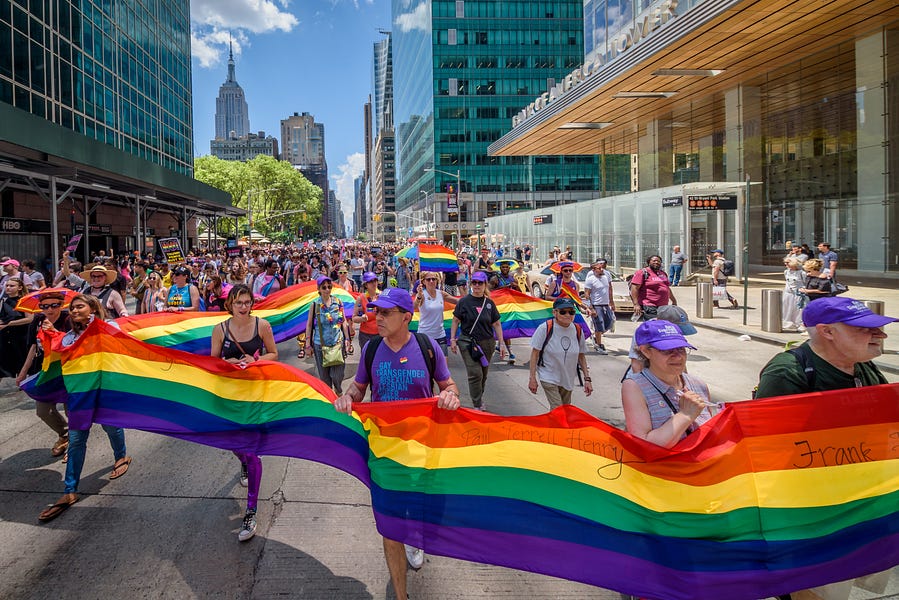In the 42 years since Gallup began asking Americans whether gays and lesbians should “have equal rights as non-gays or non-lesbians in terms of job opportunities,” an overwhelming majority has answered in the affirmative. Yet 45 years after the first bill prohibiting sexual orientation discrimination was introduced in Congress, gay Americans still lack basic protections on the federal level. What explains this massive disparity in public attitudes and public policy?
As tempting as it may be for progressives to blame recalcitrant Republicans and conservatives, the answer has as much to do with their own zero-sum approach.
In 2007, Rep. Barney Frank introduced a version of the Employment Non-Discrimination Act that included protections for gay and, more controversially at the time, transgender people. After it died in committee, Frank reintroduced the bill, this time shorn of protections for gender identity, and it passed the House. When left-wing activists howled, Frank responded sensibly that, while legislation encompassing transgender people had no chance of becoming law at the time, one that protected gays might.
Frank’s pragmatism fell on deaf ears. One of the country’s first openly gay congressman, he was denounced as a traitor to the LGBT community for trying to achieve legislation protecting the vast majority from discrimination even if it meant temporarily excluding some people on the road to full equality.
After Barack Obama became president, transgender protections were reapplied to ENDA. Yet for the duration of his presidency, the bill repeatedly died in both House and Senate committees, primarily due to Republican opposition on the transgender issue.
“I think to do nothing at all—that was the argument, if you can’t include everybody, you can’t include anybody—in the first place, that’s not the history of the civil rights movement,” Frank said in 2017, reflecting on the failure to pass ENDA during eight years of the most pro-LGBT administration in history.
Today, LGBT activists are confirming Frank’s criticism by advocating for a bill that has no chance of becoming law. The Equality Act, which passed the House last year, would not only amend the Civil Rights Act of 1964 by prohibiting discrimination on the basis of sexual orientation and gender identity in employment and housing, but also public accommodation and religious institutions. By attempting to curtail religious freedom with a bill that is unlikely to pass, supporters of the Equality Act are ensuring the persistence of a status quo they purport to find intolerable.
It’s in response to a near-half-century of inertia that a coalition of LGBT and religious freedom activists unveiled legislation entitled “Fairness for All” in December. Modeled on a Utah law painstakingly hammered out between the Mormon Church and LGBT groups in 2015, the bill strikes a balance between protecting LGBT individuals from discrimination as well as the constitutional rights of religious believers. Fairness for All prohibits discrimination against LGBT people in housing and employment, the sectors where they are more likely to encounter bias and which are the most economically impactful. And the legislation would provide exemptions for religious institutions, adoption agencies, and small businesses. A Catholic adoption agency, for instance, would not be forced to choose between serving same-sex couples and shutting down operations, as they have in some states. Under Fairness for All, they would have to refer such couples to another agency.
Fairness for All marks the first time conservative religious organizations have supported anti-discrimination laws for LGBT people at the federal level, and for that reason alone it is significant. It is also eminently realistic, as people who support religious freedom over gay rights are unlikely to support any non-discrimination measure unless it provides clear carve-outs for believers.
To this good-faith effort at compromise, something so sorely lacking today, the LGBT establishment have responded with outrage. “An affront” is how the Human Rights Campaign, the country’s leading LGBT organization, describes Fairness for All. What’s truly an affront is the stubborn insistence on making the perfect the enemy of the good, something that will indefinitely consign millions of LGBT people to potential discrimination.
The experience of the African-American civil rights movement is instructive here. The first civil rights bill of the 20th century was passed in 1957 after segregationist Sen. Strom Thurmond launched the longest one-man filibuster in history. Three years later, Congress passed the Civil Rights Act of 1960, establishing federal monitoring of state voter registration. It was not until 1964 that President Lyndon Johnson signed the most significant piece of civil rights legislation, what is today simply referred to as the Civil Rights Act, which bars discrimination on the basis of race, religion, sex, or national origin; mandates equal application of voter registration requirements; and prohibits segregation in schools, employment, and public accommodation. The Voting Rights Act came the following year, and housing discrimination was not proscribed until after the assassination of Dr. Martin Luther King in 1968.
Every campaign for social reform is gradual. It took almost 25 years until President Dwight Eisenhower’s executive order purging gay men and women from the federal government was partially rescinded by the Civil Service Commission opening jobs to gay people, and another two decades until President Bill Clinton lifted the ban on gays receiving security clearances.
The last remaining barrier to full gay equality today is the lack of a federal non-discrimination law. Given supportive public attitudes, this should be readily attainable. After 45 years of waiting, gay Americans have a real shot with Fairness for All. Gay groups should explain why they should wait 45 more.
James Kirchick is a visiting fellow at the Brookings Institution and is at work on a history of gay Washington.
Photograph of LGBT activists marching in New York by Erik McGregor/Pacific Press/LightRocket via Getty Images.






Please note that we at The Dispatch hold ourselves, our work, and our commenters to a higher standard than other places on the internet. We welcome comments that foster genuine debate or discussion—including comments critical of us or our work—but responses that include ad hominem attacks on fellow Dispatch members or are intended to stoke fear and anger may be moderated.
With your membership, you only have the ability to comment on The Morning Dispatch articles. Consider upgrading to join the conversation everywhere.